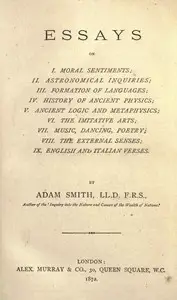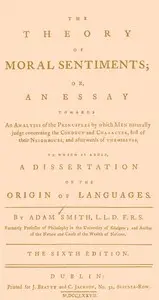
Adam Smith
Adam Smith was a Scottish economist and philosopher who was a pioneer in the thinking of political economy and key figure during the Scottish Enlightenment. Seen by some as "The Father of Economics" or "The Father of Capitalism", he wrote two classic works, The Theory of Moral Sentiments (1759) and An Inquiry into the Nature and Causes of the Wealth of Nations (1776). The latter, often abbreviated as The Wealth of Nations, is considered his magnum opus and the first modern work that treats economics as a comprehensive system and as an academic discipline. Smith refuses to explain the distribution of wealth and power in terms of God's will and instead appeals to natural, political, social, economic, legal, environmental and technological factors and the interactions among them. Among other economic theories, the work introduced Smith's idea of absolute advantage.

An Inquiry Into the Nature and Causes of the Wealth of Nations
Discover how a nation's prosperity hinges on its labor force and the smart allocation of resources, shaping the very structure of world economies.
By Adam Smith

The Essays of Adam Smith
Discover a world where feelings shape right and wrong, connecting us to others through shared emotions in a journey through human nature and ethics.
By Adam Smith

An Inquiry into the Nature and Causes of the Wealth of Nations
Discover how dividing work, gathering resources, and smart government policies can turn any nation into an economic powerhouse.
By Adam Smith

The Theory of Moral Sentiments Or, an Essay Towards an Analysis of the Principles by Which Men Naturally Judge Concerning the Conduct and Character, First of Their Neighbours, and Afterwards of Themselves. to Which Is Added, a Dissertation on the Origin of Languages.
Explore within to discover how mankind's innate ability to feel for others influences judgements about what is right and wrong.
By Adam Smith
